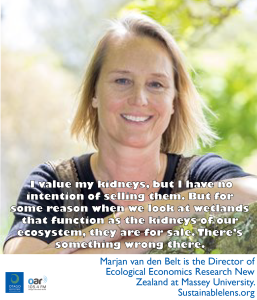I value my kidneys, but I have no intention of selling them. But for some reason when we look at wetlands that function as the kidneys of our ecosystem, they are for sale. There’s something wrong there.
Associate Professor Marjan van den Belt is the Director of Ecological Economics Research New Zealand at Massey University. She is an Ecological Economist. Â We talk about what led her to a career in economics and how that became ecological economics and what that means.
Talking points
I was an environmental activist from an early age – it has always been a part of me, perhaps my methods have become more refined over the years.
I chose economics because I thought that understanding the world’s money systems
The human system should be within the carrying capacity of the ecological system
Ecological economics is not so much how we use the existing economic tools on environmental issues (that would be environmental economics), ecological economics aims to design and develop new types of tools
Ecological economics is not particularly impressed with GDP – Gross Domestic Product – because it measures economic activity only. It does not distinguish whether that activity is desirable or undesirable. For example if we have sickness, war, disasters, crime that’s all good for GDP. Whereas the things that we do want – healthy families, low crime, environmental volunteering – that is not counted as valid activity for GDP.
You get a distorted picture when you take GDP as a proxy for well-being or wealth.
Uneconomic growth is when we don’t count costs and benefits in decision making – such as benefits we derive from the ecosystem that are not in our decision making.
New Zealand should take a good look at whether we are experiencing uneconomic growth.
We train economists to think that if only we could include all externalities in our decision making framework – the market – then we’re all sweet. The problem is that goods and services from ecosystem services don’t behave as marketable goods.
We’ll never have all the externalities, all the science, by looking in smaller and smaller pieces, hence I’m all for transdisciplinary approaches using synthesis – put the pieces together in an elegant way.
We really need more synthesis – putting the pieces together, not just taking apart.
Trickle-down hasn’t worked,
We need to decouple economic growth – measured as development, all the things that are desirable – from material throughput.
All over the world we see GDP growing, while the Genuine Progress Indicator levels off.
Facilitating complex dialogue
Systems dynamics is not about prediction, it’s about understanding.
How do we make better decisions in a timely fashion? How do we develop the capacity to make the best possible decision in the most transparent way? How do we synthesise the information we have effectively?
Systems thinking is an uncommon common sense.
We’ve kind of forgotten the art of synthesising things back together. It’s my big quest, bringing the disciplines together.
We assume that value can only be monetary, but it’s not. We use values in many different ways – to measure things, to express to whether we care for it, ethical aspects. I would say I value my children, but they’re not for sale to the highest bidder. I value my kidneys, but I have no intention of selling them. But for some reason when we look at wetlands that function as the kidneys of our ecosystem, they are for sale. There’s something wrong there.
Sometimes putting a monetary value on something can be a good conversation starter, but it doesn’t mean we should immediately create a market for it.
Pricing is different from valuing, we need to get that lingo straight.
The fragmented approach isn’t really helping. So provide the space, put people together, connect the dots.
(Superpower) Time travel for backcasting…and the beauty is that we have these tools. We do have to crack silly measures like GDP, and intellectual property rights over ecosystems
(Success) Working with Maori – that holistic, moralistic way of looking at the world. I find that creative and giving and promotes dialogue.
(Motivation) While we have to acknowledge that the trends aren’t good – I’m not in denial about this – but I choose to wake up every morning and work towards solutions, because I enjoy that the most.
(Activist) Active. Does this make me an activist. Sometimes I do show up and bang my fists on the table, but my natural tendency is as a mediator, a facilitator – providing participatory leadership inviting people into that space.
(Challenges) Establish a synthesis centre.
(Miracle) That we really start to understand how dependent we are on ecosystems. That there is great opportunity and excitement in redesigning our human society to respect and stay within those bounds. That for me is very exciting.
(Advice) Keep at it. Find the right people, don’t be in denial. Be courageous.

